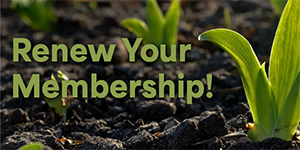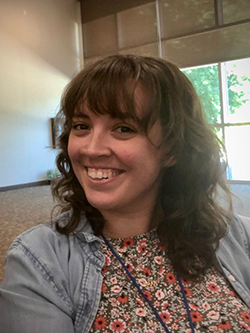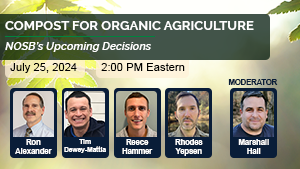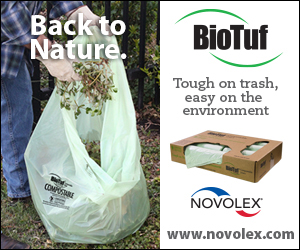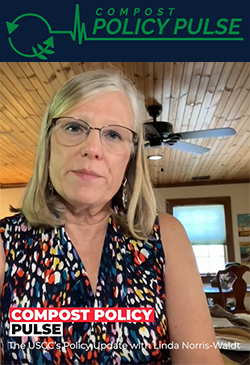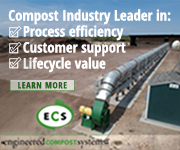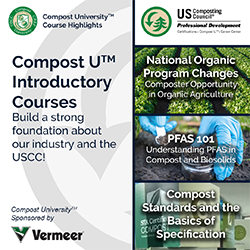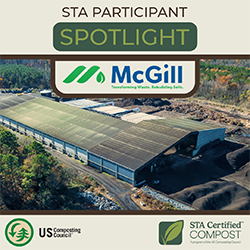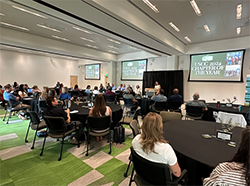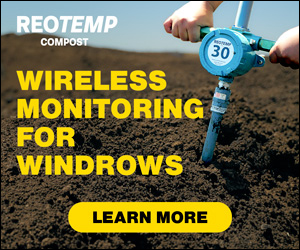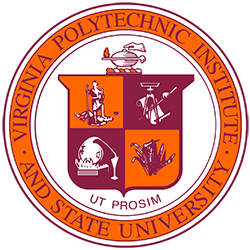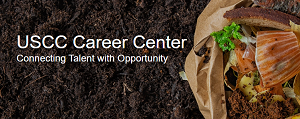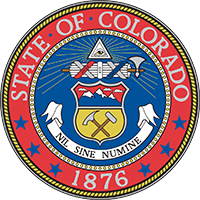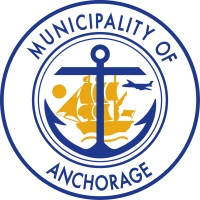 |
||||||||||||||||||||||||||||||||||||||||||||||||||||||||||||||||||||||||||||||||||||||||||||||||||||||||||||||||||||||||||||
| Past Issues | Subscribe | Send to a Friend | compostingcouncil.org | ||||||||||||||||||||||||||||||||||||||||||||||||||||||||||||||||||||||||||||||||||||||||||||||||||||||||||||||||||||||||||||
Linda Norris-Waldt, Deputy Director
The BLS is preparing to launch a much-needed industry study based on the code we have secured in the North American Industry Classification System (NAICS 325315 Compost manufacturing). Data from this study will update the sample of goods and services that makes up the monthly Producer Price Index data for our industry. The PPI tracks prices for most goods and services produced in the United States and all indexes are available for free online at www.bls.gov/ppi.
Greater industry recognition, especially from the federal government, helps build future opportunities, such as grants and programs that will encourage people and companies to compost. Right now, the avenues for industry support are narrow, and legislative and regulatory inconsistencies varying by state and municipality make it difficult reaching a general consensus on our work at the federal level. Our executive director Frank Franciosi recently met with CNBC to discuss this very issue, owing it to a lack of bipartisan support.
We've extended the deadline to submit your speaker abstracts for COMPOST2025! If you're interested in presenting a session or workshop at COMPOST2025, you must submit your abstract by Friday, July 12, at 11:59 p.m. Pacific Time. For more information on how to structure your abstract(s) and how to apply, click the link below.
The USCC is stronger today than we've ever been, and the composting industry is stepping onto the national stage! The U.S. Senate recently passed the Recycling and Composting Accountability Act, and, during the past year, USCC staff, board members, and members met with congressional offices and committees to request PFAS Superfund liability exemptions. For more than a year, the USCC’s lobbyist for these endeavors has been privately funded through generous special underwriting from a small number of members and drawing on the Council’s financial reserves. All the collective organizing, networking, advocacy, and developments in the compost industry are made possible by the tireless efforts of our volunteer committees, industry partners, staff, board members, and members like you! It's through our combined voices in the Compost Action Center, state chapters, committee meetings, and endeavors on Capitol Hill we can affect the necessary changes for our industry to flourish. Thank you for being a part of the membership of the USCC, and we are honored to be trusted with representing you! Renew Today
The USCC is happy to welcome Ksenia Dobbs as our newly appointed customer experience specialist. A Maryland native, Ksenia earned a bachelor’s degree from Stevenson University and also holds a permaculture design certificate focusing on incorporating sustainable agricultural practices. In addition to professional experience in customer service and plant care, Ksenia also runs a free plant-and-produce stand, with the goal to make backyard gardening more accessible. In her free time, Ksenia also volunteers as a master gardener with local community gardens. Please join us in welcoming Ksenia, and we hope to continue growing our staff as the USCC and the industry as a whole grows!
The National Organic Standards Board is a federal advisory board made up of 15 dedicated public volunteers from across the organic community that considers and makes recommendations on a wide range of issues involving the production, handling, and processing of organic products. The NOSB generally meets twice per year at a free, public meeting to discuss the items on its work agenda, vote on proposals, and make recommendations to the Secretary. The second 2024 NOSB meeting will take place Oct. 22-24, 2024, in Portland and will discuss substances petitioned for addition to or deletion from the National List of Allowed and Prohibited Substances, substances due to sunset from the National List in 2026, and recommendations on organic policies.
Featuring compost industry professionals Ron Alexander, Tim Dewey-Mattia of Napa Recycling, Reece Hammer of Athens Services, Rhodes Yepsen of BPI, and Marshall Hall of NOPE Compost Co. as moderator, this webinar will have these experts sharing their insights on what the meeting could entail and the potential effects on the industry.
The webinar takes place on Thursday, July 25, at 2 p.m. EDT. Register today to secure your spot and join the conversation!
The USCC has launched the Compost Policy Pulse, a monthly policy update campaign aimed to provide insight and updates on federal legislation or programs that affect our industry as well as policy-related news from the USCC.
Our inaugural update for June touched on news such as the National Strategy for Reducing Food Loss and Waste and Recycling Organics, the Farm Bill, and the Compost Caucus.
These updates are brought to our members from our Public Policy and Lobbying Program and the Legislative and Environmental Affairs Committee, a member committee that meets monthly to discuss legislation, regulation, issues, and programs.
Click the link below to watch June’s Compost Policy Pulse.
Want to learn more about the composting industry but don't know where to start? Check out some of Compost University'sTM introductory courses! These courses cover a wide range of topics, from sessions on how PFAS affects compost to conversations on recent national policy changes affecting the industry.
Click the button below to search through our course catalog.
McGill Environmental Systems provides a full range of services related to the manufacturing, distribution, and sale of high-quality compost, as well as other biological treatment and remediation technologies. Organizations from municipalities, industrial companies and agricultural businesses depend on McGill’s state-of-the-art technologies and proven processes for their compost needs.
Learn more about the STA Program by clicking the button below.
The USCC’s Colorado affiliate chapter, the Colorado Composting Council, celebrated the enactment of the Compostable Product Labeling Act, which includes compostable packaging as a way to crack down on green washing in Colorado and improve labeling education for Colorado citizens. Chapter members are pictured here at the Statehouse with Sen. Lisa Cutter, who sponsored the successful legislation. For a peek at the reporting form for suspected greenwashed products, click here. The law requires the following:
See more information at the link below.
The North Carolina Composting Council held their annual meeting on June 18, where more than 45 attendees learned about the NCCC’s work developing, promoting and expanding composting and compost use in North Carolina. Guests from across the state included the City of Raleigh, the City of Greensboro, North Carolina State University, Vermeer All Roads, SCS Engineers, and more.
The NCCC also recognized their 2024 grant recipients Second Harvest Food Bank, Compost Mates, and Toward Zero Waste.
The USCC’s Young Professionals Membership Scholarship is now open for 2024-25. We are offering Individual Soilbuilder Memberships to 15 Young Professionals in return for volunteer service hours supporting the YP group's initiatives and events. Applications are due July 25, 2024.
Those who apply and receive a membership estimated at $180 will have access to USCC member benefits such as free webinars and access to USCC's membership directory. You'll be responsible for pledging at least 12 hours to your selected committee during your scholarship year. These committees are directly responsible for furthering the young professional network and community in the composting industry.
To learn more about the scholarship as well the YP Standing Committees, click the button below.
Researchers in Virginia Tech's College of Agriculture and Life Sciences are developing biodegradable bioplastics from food waste to give those materials a new – and useful – life.
“By creating cost-effective bioplastics that naturally decompose, we can reduce plastic pollution on land and in oceans and address significant issues such as greenhouse gas emissions and economic losses associated with food waste,” said lead researcher Zhiwu "Drew" Wang, associate professor in the Department of Biological Systems Engineering and director of the Center for Applied Water Research and Innovation.
Rubicon Technologies, Inc., a leading provider of technology-based waste and recycling solutions, today announced that Phil Rodoni will be stepping down as CEO of Rubicon and as a member of the Company’s Board of Directors effective immediately. Osman Ahmed, formerly lead independent director on Rubicon’s Board, has been appointed interim CEO.
Ahmed served as lead independent director on Rubicon’s Board of Directors since the fall of 2022. He is co-founder of New Circle Capital, a structured capital provider to small and mid-cap companies, and senior advisor at 10X Capital, a multi-strategy technology investment firm.
In the latest NatureWorks News Post, and in reference to the new meta-study from Holland Bioplastics, global marketing and communications director Leah Ford points out the process of disintegration by hydrolysis followed by biodegradation is the same process that products made from PLA undergo when in a composting environment. This is also why we should also understand PLA does not create persistent microplastics in compost.
Organics Management is a new leader in the field of organic recycling, dedicated to transforming waste into valuable resources while promoting soil health and environmental sustainability. These initiatives, spanning from innovative compost biotechnology to the development of high-quality soil amendments, are guided by a commitment to safeguarding the planet and enhancing community well-being.
The company was formed through the strategic acquisition of industry-leading companies highlighted by USCC members Harvest Quest, CompostUSA, Southeast Soils, and LifeSoils. The consolidation of this expertise and launch of a new brand marks a significant step forward in their vision of delivering innovative and sustainable solutions in the field of organics management, reflected in the tagline “Earth’s Helping Hand.”
CompostNow recently had University of Georgia student Alexandria Anderson Sellers complete her summer internship with them, with a final deliverable being an article summarizing her experience and, specifically, CompostNow's drop-off program in partnership with the City of East Point. A unique perspective of Alexandria was that she was only a middle-schooler when her household first started composting with CompostNow, and in her article, she details how she developed a greater appreciation for the work CompostNow and the greater composting industry does as a whole.
Click the button below to read Alexandria's full article.
Compost Crew has recently combined forces with Key City Compost, a like-minded company based in Frederick, Maryland, with whom they share several years of collaboration. Key City Compost services thousands of customers primarily in Frederick County and the northern half of Montgomery County, Maryland, as well as parts of Northern Virginia.
Both companies have worked during the past seven years to make food scrap collection more convenient to residents of the greater Washington, DC, area. Key City provides many of the same services that Compost Crew does – residential and commercial food scraps collection. In fact, the two companies have partnered together on more than one occasion in the past to service commercial customers with locations that span both of our service territories.
The US Composting Council is seeking qualified bidders to develop a manual to serve as a reference for compost manufacturers, regulators, and anyone involved in expanding, running, and regulating the U.S. network of facilities designed to produce quality, source-separated compost from a range of common feedstocks. It will contain easy-to-reference chapters on compost operations such as water quality, air quality, fire, contamination, health and safety, feedstocks, facility operations, and composting methods.
Featured Job of the Month: Compost Facility Superintendent - Los Angeles County Sanitation Districts
Join the Sanitation Districts as a Compost Facility Superintendent at Tulare Lake Compost and lead the way in innovative environmental management! This pivotal role offers the unique opportunity to oversee and enhance the operations of a state-of-the-art composting facility in the heart of California’s renowned agricultural region. Tulare Lake Compost, a clean, publicly owned facility, ensures high-quality control of organic materials, setting it apart from privately run compost facilities. As a superintendent, you will ensure compliance with EPA standards, manage a dedicated team, and coordinate with engineering experts to optimize facility performance. Enjoy a supportive work environment that values professional growth through tuition reimbursement, professional development, scheduled salary increases, and a coveted 9/80 schedule. With a focus on safety, cleanliness, and community relations, you will be instrumental in maintaining high standards and positive local engagement. Embrace this dynamic position to advance your career while contributing to sustainable waste management and community well-being.
The U.S. Department of Agriculture – Natural Resources Conservation Service – NHQ – Office of Urban Agriculture and Innovative Production (OUAIP) is collaborating with National Institute of Food and Agriculture (NIFA) through an interagency agreement for implementation of the Composting and Food Waste Reduction (CFWR) Pilot Project Cooperative Agreement Program. Grant awards will range between $75,000 and $400,000.
The theme for International Compost Awareness Week 2025 is "Sustainable Communities Begin With Compost!" This theme was chosen with the goal of highlighting composting in all kinds of communities at any scale – backyard home composters, community composters, large-scale facilities, and all who recognize the many benefits of using compost on our soils. As has been done for the past several years, the theme was chosen by all the international partners who are part of the International Compost Alliance, making it truly an international theme. This year’s theme was inspired by the United Nations Sustainable Development Goal #11, “Sustainable Cities and Communities: Make cities and human settlements inclusive, safe, resilient and sustainable.” ICAW will be held May 4-10, 2025. The poster contest will start on Sept. 1, 2024, and end Nov. 1. There also will be a new bookmark contest for children ages 10-13. You can learn more about the new theme and the contests on the CREF website. If you're interested in being a 2025 ICAW sponsor, please contact Beth Simone at bethsimone@compostfoundation.org.
In early June, CREF was pleased to bring our Compost Operations Training Course to Orange County Waste & Recycling staff at Frank R. Bowerman Landfill in Irvine, California. The training attracted 29 employees from across OCWR’s departments, including those involved in civil engineering, finances, marketing, and on-site operations at OCWR’s municipal composting site. The training included hands-on compost pile building and monitoring, lectures instructed by subject matter experts, and facility tours, which featured three sites in San Diego County operated by Waste Management, the City of San Diego, and Republic Services. This is the third time OCWR has requested this service from CREF, having previously held COTCs for their staff in 2018 and 2021. We're honored to be part of the county’s ongoing commitment to sustainable organics recycling and providing quality professional development for their employees. As SB 1383 catalyzes California municipalities to increase organics collection and recycling, OCWR has plans to launch or expand compost facilities across its waste management sites, and we're confident the knowledge gained at the COTC will propel them toward success.
Jacob Wallace | Waste Dive
The New York City Council and Mayor Eric Adams have agreed to restore more than $6 million in funding for community composting, reviving a program that was axed by the mayor’s budget cuts in the fall but received strong political support from council members. The council also shifted the funding mechanism for the program in a way that would shield it from future budget cuts and added money for other sanitation priorities.
The restored funding will cover longstanding groups such as GrowNYC. It also funds a broader range of organizations than before, including microhauler Bk Rot and The Brotherhood Sister Sol, which operates a community garden in Manhattan.
Erin Leigh-Hoffman | The Greenfield Recorder
GILL, Mass., July 3, 2024 — A new community composting plan was approved by the Selectboard on Monday night, beginning the process of getting a weekly compost collection program off the ground for Gill residents as a prior food waste pickup system is phased out.
A “composting coop” will be located near the electric vehicle charging stations in the parking lot of the Riverside Municipal Building on Route 2. Residents who wish to use the site to drop off five-gallon pails of food waste can sign up to receive a padlock code to access the enclosure once sign-up becomes available. The placement of the composting coop away from homes, with wood shavings placed on the ground, is designed to alleviate odor from the food waste.
Sam Brasch | Colorado Public Radio
CENTENNIAL, Colo., July 3, 2024 — On July 1, a new Colorado law took effect to address the problem by setting “truth-in-labeling” standards for compostable products. Kelly Leviker, an anti-plastics advocate for the Colorado Public Interest Research Group, said the goal is to root out anything that looks compostable but isn’t certified to break down in an industrial compost heap. Behind the issue is the rise of compostable packaging at restaurants and on store shelves. The growing market promises consumers the convenience of disposable products without environmental guilt.
In reality, however, many look-alike non-compostable cups and takeout containers aren’t certified as compostable by the Biodegradable Product Institute, the leading labeling authority for North America, or the Compost Manufacturing Alliance, another certification group working directly with compost processors.
Mohamed Ibrahim | MinnPost
MINNEAPOLIS, Minn., June 27, 2024 — The use of e-commerce and deliveries has seen a dramatic rise in recent years, and alongside it the amount of packaging waste that ends up in Minnesota landfills each year. About 40% of waste statewide now comes from packaging, prompting lawmakers to put the onus on the manufacturers of that packaging.
The Packaging Waste and Cost Reduction Act passed by the legislature last month aims to remedy old problems and new ones. Lawmakers and advocates hope it will lessen the environmental impacts of packaging made up of plastic and other non-recyclable waste, while also creating sustainable funding for recycling efforts that have become too expensive for many residents and local governments statewide. One of the requirements is for all packaging to be recyclable, reusable, or compostable by 2032. Companies that don’t comply won’t be able to sell their products in Minnesota and could face fines of up to $25,000 a day.
Lauren Maxwell | Alaska's News Source
ANCHORAGE, Alaska, June 28, 2024 — The building that was once Anchorage’s Midtown Transfer Station has a new name, the Materials Recovery Facility, and it has a new purpose: to divert both plastics and organics from the landfill and turn them into something useful. It’s a pilot program set to run through the end of October.
Residents and commercial companies can drop off things like grass clippings, small yard debris, and other organics at a cost of $20 per truckload or $40 for a truck and trailer load. A bin outside the facility accepts food scraps for free. Acting Solid Waste Services Director Kelli Toth said the organic material will be trucked to a farm in Palmer that makes topsoil and compost, a better fit, she said, than putting them in the landfill.
|
||||||||||||||||||||||||||||||||||||||||||||||||||||||||||||||||||||||||||||||||||||||||||||||||||||||||||||||||||||||||||||



